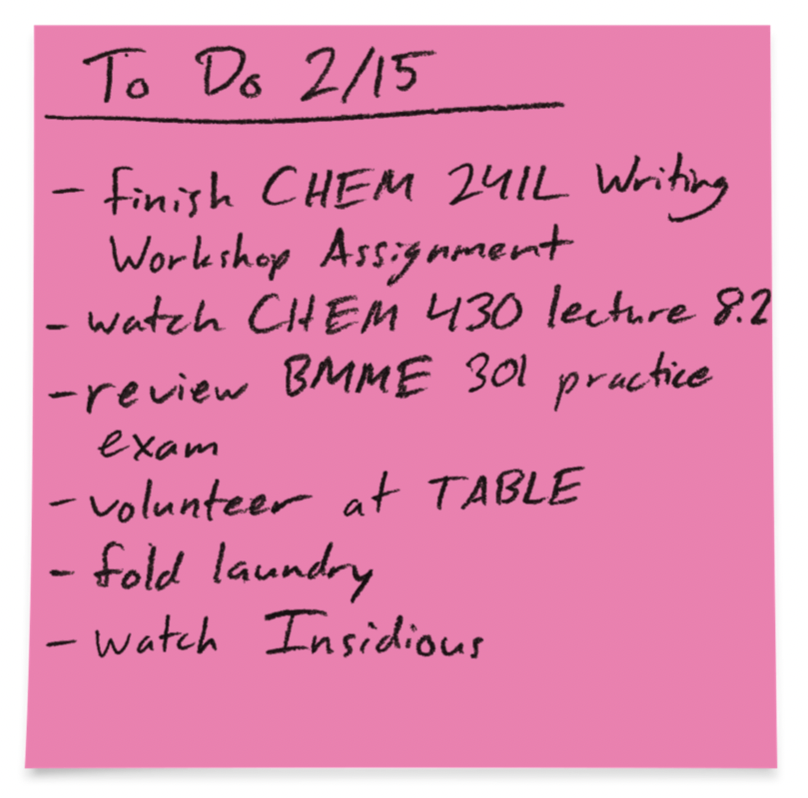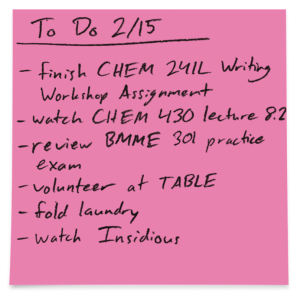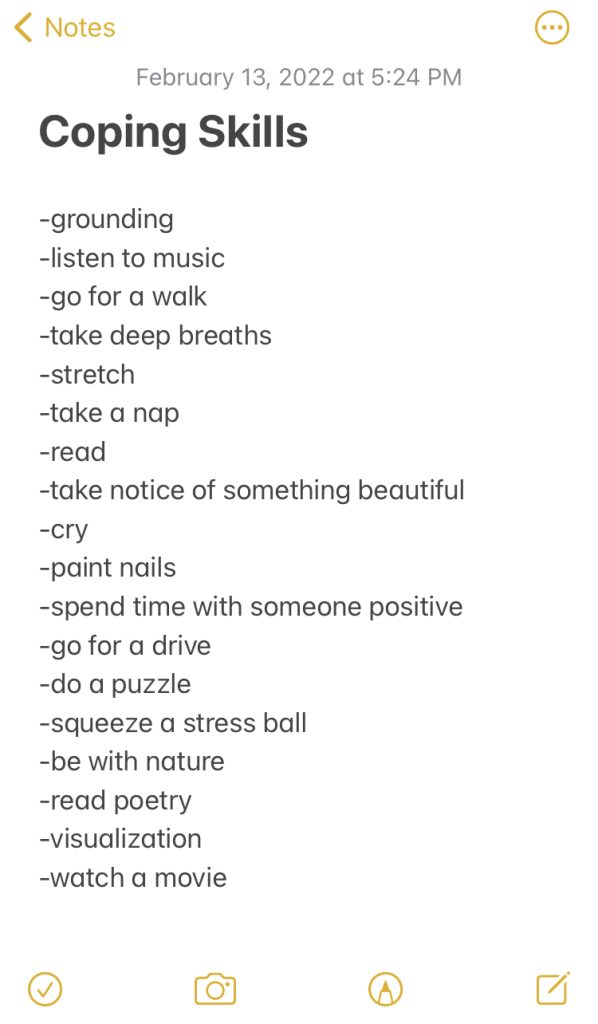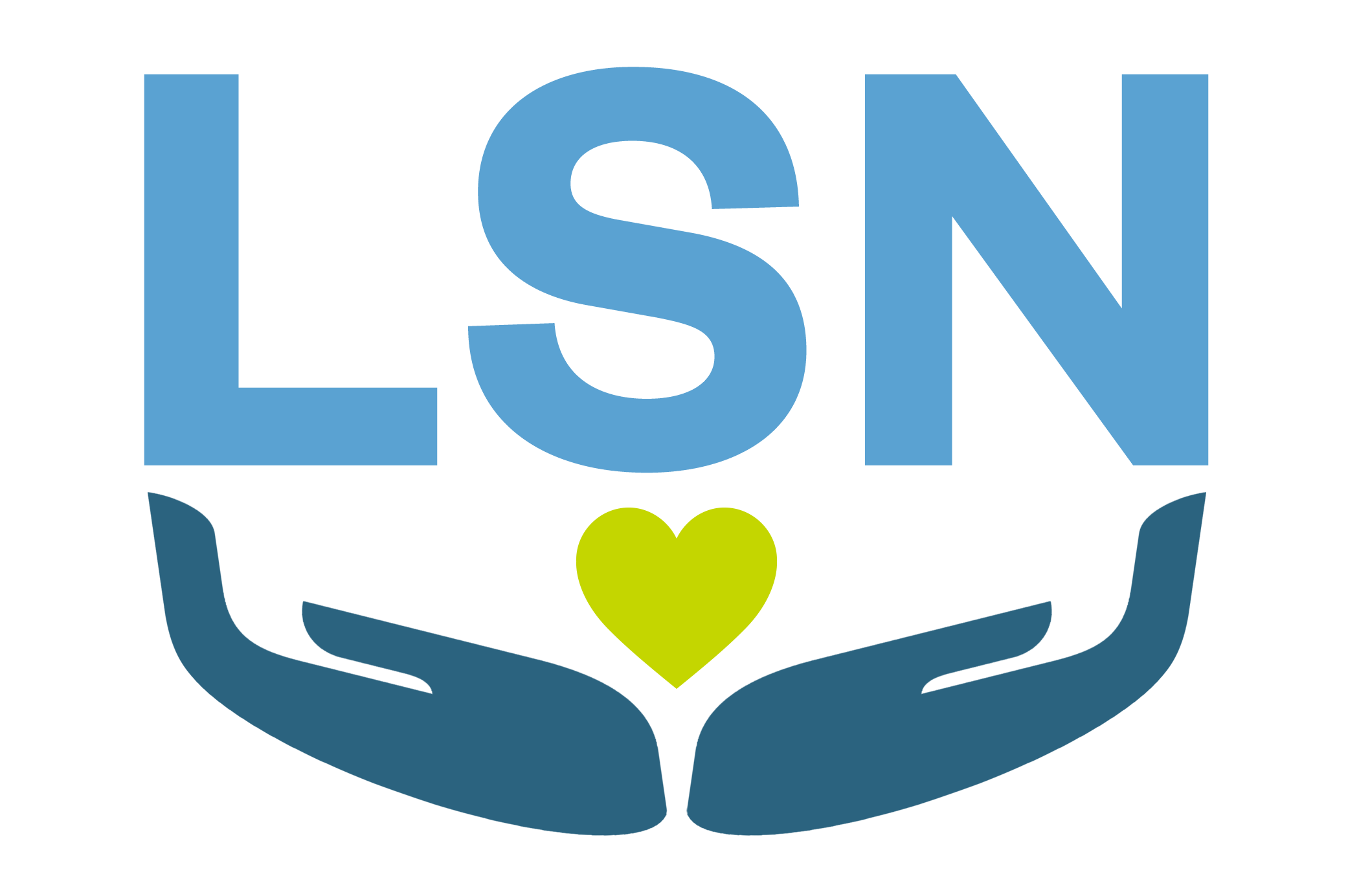Finding a Balance: How I Manage My Mental Health in College

By Alyssa, a Peer Tutor at the Writing and Learning Centers
I didn’t realize how much school affected my mental health until my Freshman year of college. I was sitting in my dorm, listening to my heart pound in my chest at the mere thought of doing poorly on my next physics exam and wondering how I had let my stress get so out of control.
“Fun Fact: the average person can throw a baseball at least 3 giraffes high”
Unfortunately, this cute giraffe fact that my professor put on our first physics exam did not make me feel any better about my exam grade. I have a tendency to beat myself up about my academic performance. In high school, my friends would roll their eyes and assume I was humble-bragging whenever I complained about missing one or two questions on an exam, but every little mistake made me think, I am lazy and stupid and just not trying hard enough.
My transition to college was hard in many ways I had never anticipated. I was struggling to understand the content in some of my classes, which I never experienced in high school. Every time I bombed a physics test or couldn’t figure out how to make my code work for my programming class, I felt like a fraud and a failure. It got harder and harder to find the motivation to do things I actually enjoyed. Tasks like studying concepts I hadn’t understood in lecture or solving problems that would take me hours to figure out seemed totally insurmountable.
At times, just the mention of school left me spiraling. This is hopeless. Life is exhausting. The only way I kept up with my school work was by leveraging my fear that I will be an even bigger failure to force myself to be productive.
Although college was not the cause of my mental health problems, being in a high-stress academic environment far from my support system exacerbated my underlying depression and anxiety beyond what I could handle on my own. Learning to acknowledge and cope with mental illness has been a long, often challenging process, and I am still figuring out how to manage my mental health with academics and extracurricular activities. Here are some of the most important lessons I’ve learned (so far) about balancing mental health with college life:
Learn Your Low Points
Having a mental illness can be incredibly isolating. My depression makes it hard for me to believe that I deserve help and even harder to find the motivation to seek it out. That means it is important for me to be conscious of signs that I need help and make an extra effort to connect with the resources I need. On the mental health side, I keep tabs on my mood and look for indicators that I need another therapy appointment. More recently, I reached out to my primary care physician for medication to help me manage some of my more severe symptoms.
On the academic side, asking for help means that when I find myself struggling in class, I don’t retreat inward and get stuck in a cycle of telling myself I should be smart enough to figure this out on my own. Instead, I accept that asking for help is part of the learning process and seek out the support I need to maximize my success in every class. If I’m confused about a concept or assignment, I usually start by talking to one of my friends in the class.
The idea of talking to a professor or TA about a problem I’m having can be a bit more daunting. When I start drafting an email to a professor, I always feel a bit afraid of coming across as incompetent. To combat that anxiety, I take care to write a polite, professional email and do my best to remember that most professors are more than happy to support their students.
I also keep resources like Peer Tutoring and Academic Coaching on my radar in case I need extra one-on-one support. Asking for help and making a proactive effort to connect to the resources available to me has helped relieve some of the anxiety I feel about school. Instead of spending hours getting frustrated with myself for not being able to figure out a problem, I seek out support when I need it. Becoming more comfortable with the concept of asking for help makes me a better collaborative learner and helps me view challenging problems as opportunities to grow as a student instead of evidence of my own limitations.
Build Bridges
Before Freshman year, I had never been away from home for more than a week or so at a time. When I lived at home, I was surrounded by people that I could talk to if I needed support. Living at college was different: even though I had close friends, in the back of my mind, I felt like no one can understand what I’m going through. It was easy to give into the urge to isolate myself whenever I was feeling depressed, which inevitably left me feeling even worse.
For me, the toughest part of building a new support system at college was how big everything felt. In high school, it was relatively easy to make friends, since I was surrounded by more or less the same people every day for four years. It was a lot harder to make friends in a massive lecture hall of several hundred people than it was in a classroom of thirty-some.
Over time, I learned how to reach out and make connections at college. I joined several clubs and extracurricular activities that seemed interesting to me, and I ended up meeting a lot of people with similar interests. I started talking more to the people I share classes and labs with, even if we were just commiserating about the latest grueling assignment. Every friendly face I saw on campus made me feel a bit less alone, and I found several close friends that I really clicked with as well.
When I started being open about my mental illness, I discovered that my friends and family are a more reliable support system than I ever gave them credit for. I tried talking to some of my close friends at college about my struggles with mental health, and they were encouraging and understanding. When I’m having a tough time with depression, I call one of my family members instead of isolating myself, and they always manage to make me feel a bit better.
Connecting with my support system makes it easier to manage the ups and downs of my mental illness, which helps me get back on track to focus on classes and other activities. When I tried to keep my depression and anxiety to myself, I saw the results reflected in my coursework. I often felt too anxious to focus on studying or too depressed to find motivation to get my work done.
When I share some of my struggles with my support system, it feels a little easier to keep my mental health from interfering with the things I want to do. If I talk to my friends about an exam grade I’m upset about, they can usually talk me down from my anxiety and help me put that one grade in the context of a whole semester of opportunities to learn and improve. Having that support makes it easier for me to get out of my own head and focus on doing my best work.
Make a Plan of Action
Between classes, work, volunteering, and other extracurricular activities, my schedule for the week is usually pretty busy. Once the semester starts, the list of things I need to get done every week becomes pretty overwhelming. I spend a lot of time worrying I am never going to be able to get all this work done. Solid time management is essential for helping me manage the anxiety surrounding my to-do list.
At the beginning of the semester, I put all of my major assignment due dates in a Google calendar. I also add in volunteer shifts, club meetings, appointments, and other scheduled events as they arise. At the beginning of each week, I use that calendar to make a list of everything I have to do for that week, adding in chores or other personal activities that aren’t on the calendar. I then split the activities for the week onto seven separate Post-it notes that I stick above my desk, trying to spread the workload evenly throughout the upcoming week.
As the week goes on, I cross off activities as I finish them. When I don’t finish everything I have planned, I move to-do items to another day in the week. Knowing that I have a structured yet flexible plan to tackle the week, I can talk myself down when I start thinking I can’t handle this.
Probably the most important part of my daily schedule is that I make a point of blocking out at least one self-care activity each day. Most days, that activity is something like going for a walk, watching a movie, or reading a book. Anxiety and depression often leave me believing I don’t deserve a break. I need to keep working to make sure I don’t slip up. Scheduling a self-care activity each day reminds me that taking time for myself is important, especially on the days when my mental illness tells me otherwise. When I take time out of my day to take care of myself, I have more energy and focus to get back to work later.
Treat Yourself Right
Even though I do my best to strike an equitable balance between mental health and academics, things are far from perfect. Sometimes I spend days agonizing because I forgot about an assignment even though it was on my to-do list, or I did badly on a test that I thought I was prepared for. I still have a lot of times where depression makes it hard to find the motivation to get work done or I feel overwhelmed with anxiety about the future. It’s times like these when I need to remember to practice self-compassion.
Self-compassion means forgiving myself when things don’t work out perfectly. It means treating myself with kindness instead of derision when my depression or anxiety starts to feel insurmountable. Even when it doesn’t feel like it, I am trying my best. I can forgive myself for making mistakes. I deserve time to relax and take care of myself. For the really bad days, I keep a list of coping mechanisms on my phone so I can easily come up with something to do to make myself feel a bit better.
Balancing mental health with college life will probably never be easy. I’m still far from having everything figured out, but I’m starting to feel like I’m heading in the right direction. For now, I will do my best to stick to the strategies that work for me and try to make every day a little bit better than the one before.
Resources:
This blog showcases the perspectives of UNC-Chapel Hill community members learning and writing online. If you want to talk to a Writing and Learning Center coach about implementing strategies described in the blog, make an appointment with a writing coach, a peer tutor, or an academic coach today. Have an idea for a blog post about how you are learning and writing remotely? Contact us here.



